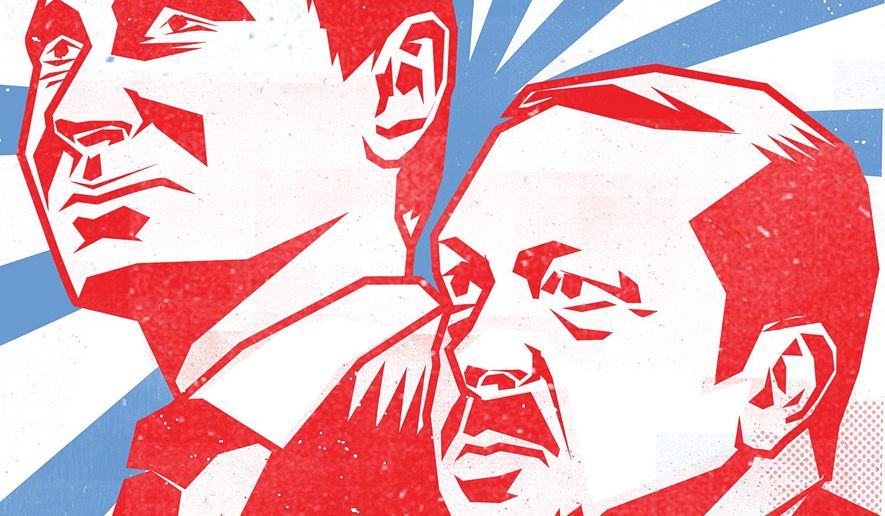OPINION:
Turkish President Recep Tayyip Erdogan’s recent meeting with Vladimir Putin in Moscow demonstrated clearly America’s deteriorating position in both Europe and the Middle East. Following Turkey’s failed military coup, Mr. Erdogan’s maneuverings, including mass arrests of his political opposition, are accelerating his acquisition of unchecked domestic power, thereby enabling him to reverse his country’s secular constitution and render it an Islamicist state.
The implications for Ankara’s membership in NATO and the West more broadly could hardly be clearer. And who was waiting to host Mr. Erdogan’s first postcoup meeting with a foreign leader but Mr. Putin in Moscow. Although Russian-Turkish history has been complicated, to say the least, often adversarial militarily and politically, Mr. Putin knows how to seize the main chance when it appears.
Distancing Turkey from NATO would be just the start. Regaining Black Sea naval dominance and ensuring unhindered Russian access to the Mediterranean through the Bosporus and the Dardanelles have been Kremlin ambitions for centuries. In today’s environment, persuading Turkey to leave the tacit alliance working to overthrow Syria’s Bashar Assad regime, a Moscow ally, would be a critical step forward for Russia’s increasing influence in the Middle East. Whether Mr. Erdogan is prepared to go further and join the Russia-Iran regional axis is unclear at this point, but the possibility is obvious.
Hiving off NATO’s southeastern anchor would also bolster Mr. Putin’s continued continental meddling in former components of the Soviet Union and members of the defunct Warsaw Pact. By annexing Crimea, Moscow violated America’s solemn determination since 1945 not to allow national borders in Europe to be changed by military force, and faced insignificant consequences as a result. Now, Russia is digging in, installing sophisticated S-400 air-defense systems in Crimea, and accusing Ukraine of dangerous provocations. NATO headquarters is rightly concerned that more Russian military incursions into Ukrainian territory may follow.
The Baltic countries are near panic that Mr. Putin will provoke incidents before President Obama leaves office, taking advantage both of his weakness and the uncertain transition period that will occur no matter who wins the presidency in November. Moscow has already launched extensive cyber-attacks against the Baltics, and trumped-up charges of mistreating ethnic Russians could easily provide a pretext for military intervention.
Mr. Putin is vigorously exploiting not only Mr. Obama’s weakness and inattention, but also the urban legend that the European Union is (or should be) the major force for keeping peace on the Continent. This mythology, ignoring or belittling NATO’s central role in deterring Moscow’s adventurism and belligerence, is widely held among Western European elites. By contrast, Eastern and Central European countries increasingly realize that economic integration, however desirable, will not alone provide for the common defense. Too many Western Europeans still fail to grasp this basic point, a failure Mr. Putin long ago seized upon.
Even more sinister are suspicions that Kremlin intelligence agencies are interfering in our elections, hacking into Democratic and Republican computers alike. For Europeans, of course, this is nothing new, having repeatedly been victimized by Russian disinformation campaigns, influence-buying and outright electoral fraud. There is, so far, insufficient public information to prove Moscow’s hand at work in America, rather than false-flag operations or even domestic hackers, but no one would be surprised if Mr. Putin were acting boldly during Mr. Obama’s final days.
Mr. Putin, however, is not without significant domestic political concerns. Continuing low global oil prices, a critical source of much-needed revenue, have clearly had their effect on Russia’s economy, far more significantly than the weak, inadequately enforced international economic sanctions related to Ukraine. Indeed, Mr. Putin has been remarkably successful at playing a relatively weak domestic hand abroad, largely because of U.S. and European fecklessness.
Western observers believe Mr. Putin’s recent firing of Sergei Ivanov, his chief of staff and longtime deputy in several key positions (and fellow KGB alumnus), signals internal Kremlin disarray, and possible weakness in Mr. Putin’s internal political support. That remains to be seen. Mr. Ivanov, a fluent English speaker, basketball player and Marlboro smoker back in the day, is very much at ease with Americans, as might be expected from a trained intelligence operative. At a minimum, Mr. Putin’s loss of an adviser relied upon for decades reveals a shrinking base of trusted aides who can speak to him in private as a colleague.
Mr. Putin’s march and America’s retreat should be a central question in Campaign 2016. Political operatives can opine endlessly about the secondary place of national-security issues in presidential politics, but there is nothing more important to the republic’s safety than protecting our rightful place in the world. The failure of candidates and strategists to appreciate this point creates a self-fulfilling prophecy, since failing to lead and inform the public on international issues leaves citizens with the false sense that foreign threats are not significant enough to worry about. Sadly, it is the American people who, in due course, pay the price for this myopia.
• John R. Bolton, a former U.S. ambassador to the United Nations, is a senior fellow at the American Enterprise Institute.




Please read our comment policy before commenting.